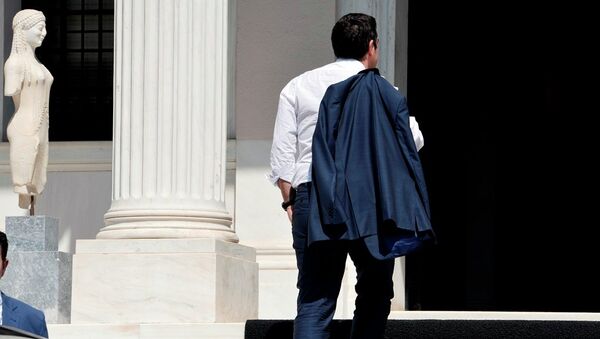"It’s France and Germany who have been calling the shots; they’re still the big dogs," Sam Bowman, deputy director of the Adam Smith Institute in the UK, told Sputnik.
"They have to see that a lot of the aspects of the European project have gone awry. Other periphery countries, like Spain with its Podemos party, will feel destroyed and terrified by this.
"What the EU has shown is that you cannot flex your muscles. Ultimately we will kick you out if you don’t do things our way. And voters in Span, Portugal and Italy will be saying we don’t want to be the next Greece."
Falling on his sword and accepting the demands from the Troika, Greek Prime Minister Alexis Tsipras must now hone his art of persuasion and convince Syriza MPs to back the bailout.
In 24 hours, the Greek government must pass laws cutting pensions, increasing VAT and slashing public spending to access Eurozone funds.
Germany has beaten Athens into submission with a bailout package former British Prime Minister "Margaret Thatcher would have even winced at," according to Bowman.
"The Germans are getting more than they wanted. Things have swung so dramatically against Tsipras that I suspect he won’t last very long. And I suspect the Syriza party won’t last long either.
"They’re just not going to be able to see their economy recovering very soon and they’ll be in a very ugly position for at least four of five years to come."
"If I was a Greek person I’d be very upset by now."
Further Economic Deterioration
The situation in Greece continues to worsen, the International Monetary Fund (IMF) has announced that Greece has missed a second debt repayment for the second consecutive month, going deeper into arrears and owing two billion euros – and the banks are still shut.
Speaking about the recent Eurozone deal, Elias Papaioannou, Associate Professor of Economics at the London Business School, told Sputnik:
"Given the deteriorating situation we are in, it’s a necessary evil," Papaioannou said. "The deal is hugely problematic because the economy has been deteriorating in the last few months and especially in the last week."
EuroSummit has unanimously reached agreement. All ready to go for ESM programme for #Greece with serious reforms & financial support
— Donald Tusk (@eucopresident) July 13, 2015
Eurozone leaders have agreed to a conditional deal to provide $94billion (86 billion euros) of finance for Greece over three years. However, the country is still facing a short-term cash crisis with the banks still closed and cracks appearing in the Syriza party.
False Sense of Relief?
Meanwhile in Athens, Professor Papaioannou says, there is a sense of relief among the Greek people that the country has avoided a 'Grexit'. He remains optimistic that the Greek parliament will pass the package of reforms and that Tsipras should stay in charge.
— Alexis Tsipras (@tsipras_eu) July 13, 2015
On the Euro Summit’s Statement on Greece: First thoughts http://t.co/7TTsbOrkof
— Yanis Varoufakis (@yanisvaroufakis) July 14, 2015
"I’m not particularly pleased — but I am pleased we avoided the worst that could have happened Greece — an exit from the European Union. So we have avoided the worst but we are stuck with a deal that has many unclear and unsatisfactory aspects to it. But even those who voted ‘No’ in the referendum are relieved. They feel relieved that we are still a member of the EU."
"I think the parliament will get this through, the main opposition parties will vote for the deal and there is going to be split in the Syriza party and in parliament. But with the support of the three pro-European parties, the deal will be ratified," Papaioannou told Sputnik.
"I personally think it would be a mistake for Tsipras to resign. He signed the deal. It has his name on it, so now he has the face of the implantations of this deal. I hope he stays, but with the support of the other pro-EU parties."



